What he talks about when he talks about Mel Gibson
Now appearing in Nathan Englander’s new play in San Diego, ‘West Wing’ star Joshua Malina has some choice words for the star of ‘Lethal Weapon’

(from left) Nathan Salstone as Trevor, Rebecca Creskoff as Debbie, Joshua Malina as Phil, Sophie von Haselberg as Lauren, and Greg Hildreth as Mark in “What We Talk About When We Talk About Anne Frank.” Photo by Jim Cox
Joshua Malina has been getting rave reviews for his performance as a secular Jew in Nathan Englander’s new play, “What We Talk About When We Talk About Anne Frank.” As for his real-life comments as a proud, outspoken and, some might say, pugnacious Jew, his reviews have been, well, not quite as kind. The most recent storm started with an essay he wrote about Mel Gibson for The Atlantic.
“Gibson is a well known Jew hater. (Antisemite is too mild),” Malina wrote. “What does a guy have to do these days to put him on Hollywood’s no-fly list.” On Gibson’s birthday, Malina made a donation to the U.S. Holocaust Memorial Museum, one he plans to make annually — “in honor of Mel Gibson should go fuck himself,” he told me.
Malina contends that “Cancel Mel Gibson” — the headline Atlantic editors put on his essay — missed the point he was trying to make.
“I don’t think cancel culture really exists if someone like Mel Gibson continues working,” he said. “It bothers me that “Lethal Weapon 5” is being pondered by Warner Bros. when its star — and I think he’s even being considered to direct it — is a well-known antisemite, misogynist, homophobe and racist. I would love to see Hollywood hold people to account. Is this someone we have to continue to laud and empower?”
Reaction to the piece, Malina says, was predictable. “When you take a shot at a prominent antisemite in my experience your opinion gets very quickly validated, because a tremendous amount of antisemitism comes your way.”
Some of the response was “serious enough that I’ve gotten guidance from experts in the area about how to avoid actual harm,” Malina said. “Most of it rolls off my back. In social media, everybody is very brave behind their keyboard. I don’t go to sleep in fear. I don’t live in fear. I don’t worry much but there have been times when people definitely have made threats and I think in this day and age it’s important to take threats seriously, even though they are unlikely to come to anything.”

On Twitter, in response to Donald Trump’s voluble criticism of purportedly unsupportive Jews, Malina recently called out the Republican Jewish Committee, the Zionist Organization of America, and the former president himself. “American Jews roundly rejected you in 2020, recognizing that allying ourselves with antisemites, misogynists, racists, cowards, and authoritarians is unlikely to improve our own lot or the lives of our fellow Americans,” he wrote.
Malina has a long and impressive list of credits that include a recurring role on “The Big Bang Theory” (college president Siebert), creating his own television show (“Celebrity Poker”) and podcasts (most recently the Jewish-themed Chutzpod). But he is probably best known for his five-year run as Will Bailey in “The West Wing” and seven years as David Rosen on “Scandal.”
In a 45 minute Zoom conversation, Malina came across as intelligent, well spoken and very funny.
He grew up in Westchester County and attended an orthodox Yeshiva until high school.
“My parents created a Jewish household where we observed Jewish holidays and we were instilled with Jewish pride,” he said. “It was something we talked about, something we felt strongly. And we had instilled in us a feeling of representing and not feeling cowed by any antisemitism out in the world.”
The following conversation has been edited for length and clarity.
One of the interesting things about your career is that you proved it isn’t who you know but your mother knows.
I’ve wanted to be an actor since I was a little kid. I went to college [Yale], graduated in ’88, moved to New York but didn’t have much of a plan on how that was going to happen.
My mom said you really should call Aaron Sorkin, and when I asked why, she said, “you know, he’s Jewish, you’re Jewish, he went to high school with your cousins.” My first response was, “This is how I’m going to become an actor? I’m just going to cold call Jews?”
But, for lack of a better strategy, I did follow my mom’s advice as a good Jewish son should and I called Aaron. We became instant friends. It was not long before he said, I’ve written this play. It’s going to be on Broadway. How would you like to audition?” I said, “Of course!” I’m a struggling actor and I auditioned and I’m sure were it not for this friendship, I would not have been asked to play a role in “A Few Good Men.”
You’ve had an enviable career. Why not play it safe?
That’s a good question.When I first started acting, I looked down on actors who are always sharing their political opinions or mouthing off on this or that. I knew enough actors to know that this person isn’t worth listening to more than anyone else, so I had a disinclination as a young actor to share my opinions on things.
Then I learned an important lesson around 1999 or maybe 2000. The Jewish Federation of Los Angeles invited me to come to a rally for Israel. The rally existed only to say that Israel had a right to exist, which did not strike me as a particularly controversial point of view (at the time). And I said, “Sure, I’ll come and sit on the celebrity dais.”
When I got there, the sign-in people didn’t know who I was. You know you’re not a celebrity when the celebrity sign-in people don’t know who you are and ask you to spell your last name. When I asked the entertainment liaison to the Jewish Federation where the actually famous people were, again she didn’t know who I was. She said if it has anything to do with Israel it’s hard to get people to show up. She said some of those famous Jews will give money but feel that putting a public face on it is risky for a career.
I don’t want to pat myself on the back for being bold or courageous, because I don’t think I necessarily am. I like to be honest about what I think. If we’re talking about Israel and the Palestinians, I think it is filled with gray issues, but generally treated with black and white. So if I can be part of a discussion that is a little more nuanced or be part of a discussion that’s a little more thoughtful than we often hear, I’m happy to.

Which brings us to your podcast “Chutzpod.” You’ve just come off a long run of “The West Wing” podcast. When your co-host Rabbi Shira Stutman asked you to join her, what was your reaction?
I just said no immediately — I didn’t know if I had the time to do it. This was just the unemployed actor always thinking I probably have a great job coming around the corner. But a few days later the whole controversy about Ben & Jerry’s closing stores in Israel or the occupied territory was breaking and Rabbi Shira sent me one more email that said that this is the kind of thing we would discuss. And that’s where she got me.
As an actor — and I’m very comfortable with this — I say someone else’s words for a living. I know that I am a small car getting a much larger machine. I’ve fallen in love with podcasting because I get to speak my mind and that’s pretty heavy stuff. For me it’s fun to be part of a Jewish conversation. It gives me the opportunity to explore my Judaism.
Let’s talk about “What We Talk About.” It’s the most Jewish thing you’ve done. It’s about two couples. The women were childhood friends. One moves to Israel and became Haredi. She and her husband are visiting her secular but wealthy friends in Miami. It’s based on a Nathan Englander short story and centers in part on intermarriage.
It’s a deeply Jewish play that resonates with me and speaks to me. It’s very funny and meaningful. This does feel like the theater version of “The West Wing” — that there is an incredible piece of writing and I’m having the time of my life.
Do you think it has a life beyond San Diego?
I’d be stupefied if it didn’t. I don’t know if I’ll be part of it. I know that if I could only play one role for the rest of my life this would be the one. I told Nathan Englander that I would sign the agreement to do that in a nanosecond. To take this to Broadway would be a bucket list item for me.
“What We Talk About When We Talk About Anne Frank” runs until Oct. 23 at the Old Globe in San Diego.
A message from our Publisher & CEO Rachel Fishman Feddersen

I hope you appreciated this article. Before you go, I’d like to ask you to please support the Forward’s award-winning, nonprofit journalism during this critical time.
We’ve set a goal to raise $260,000 by December 31. That’s an ambitious goal, but one that will give us the resources we need to invest in the high quality news, opinion, analysis and cultural coverage that isn’t available anywhere else.
If you feel inspired to make an impact, now is the time to give something back. Join us as a member at your most generous level.
— Rachel Fishman Feddersen, Publisher and CEO





















